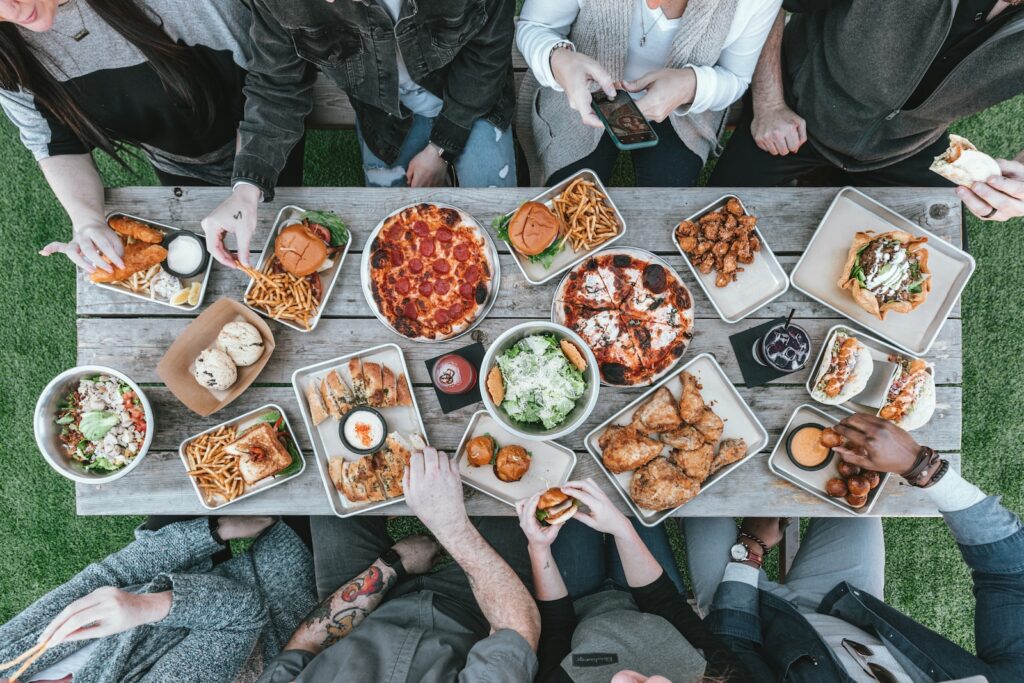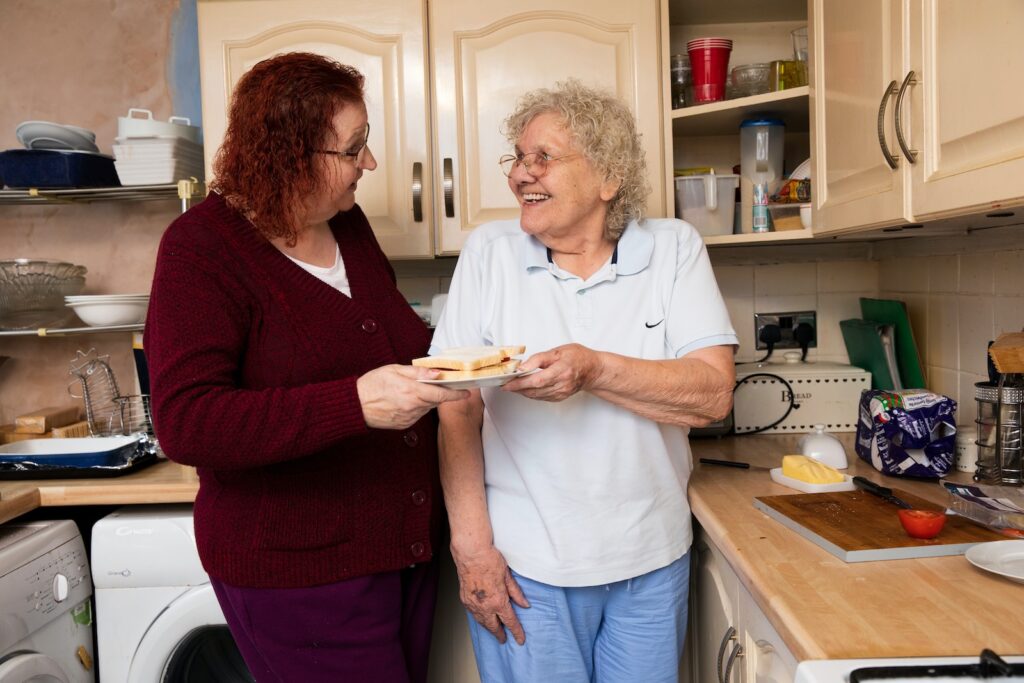
A guide to healthy eating for seniors will extend their golden years and be significant in adapting to a lifestyle that embraces longevity. As we witness an increase in life expectancy, the spotlight turns to the quality of these extended years—particularly the role of nutrition in enriching the lives of our seniors.
It’s a pivotal moment in a society where the need for specialized dietary considerations isn’t just a recommendation. In this guide, we’re not just discussing the nutritional needs of older adults; we’re looking at how informed eating becomes a powerful tool for vitality. Where we add life to years, not just years to life.
They are unlocking the knowledge, tools, and support. As well as the information for seniors to understand this unique nutritional landscape. They are paving the way for a healthier, more fulfilling life through their senior years.

Introduction
Healthy eating for seniors has to evolve and meet their nutritional needs; we must pay extra attention to what they eat to maintain good health. Today, we will explore the dietary needs of seniors and provide daily meal plans tailored to their requirements. And discuss effective ways to manage weight and prevent health issues.
Healthy Eating For Seniors Needs
As we gracefully age, our bodies undergo changes impacting our nutritional needs. To ensure a healthy and vibrant lifestyle in our senior years, we must pay attention to what we eat. In this blog post, we’ll explore the nutritional needs of seniors and provide valuable insights on how to meet these needs for a fulfilling and active life.
As we embark on the later chapters of our lives, our bodies undergo many changes, as do our nutritional requirements. The metabolism slows, the digestive system evolves, and our physiological needs shift. Seniors and their caregivers must understand these changes to ensure a diet that supports health, vitality, and longevity.
Metabolic Changes and Dietary Impact:
The body’s metabolism naturally slows down with age, meaning fewer calories are needed. However, the need for nutrient-rich foods becomes more critical. It’s not just about eating less but eating right. Seniors should focus on nutrient-dense foods that provide vitamins, minerals, and other essential nutrients without too many extra calories.
Critical Nutrients for Seniors:
Certain nutrients deserve special attention in a senior’s diet:
- Calcium and Vitamin D: Essential for bone health, these nutrients help combat the risk of osteoporosis. Dairy products, leafy greens, and fortified foods are excellent sources.
- Fiber: Important for digestive health; fiber-rich foods like whole grains, fruits, and vegetables can also help prevent heart disease.
- Protein: To preserve muscle mass, sources like lean meats, beans, and nuts should be a staple in a senior’s diet.
- Other Vitamins and Minerals: Vitamins B12, A, and C, and minerals like iron and potassium, are vital for maintaining various bodily functions, from vision to immune health.
Managing Health Conditions with Diet:
Many seniors live with chronic conditions like diabetes, hypertension, or heart disease. A well-planned diet can play a significant role in managing these conditions. For instance, a diet low in sodium and saturated fats benefits heart health, while a balanced diet with controlled carbohydrate intake is crucial for diabetes management.
In this stage of life, eating well isn’t just about prolonging life; it’s about enriching it. A diet that caters to seniors’ unique nutritional needs can significantly enhance their quality of life, allowing them to enjoy their later years with vigor and vitality.

Overcoming Healthy Eating For Seniors Challenges
Eating well can become more challenging as we age due to various factors. Understanding and addressing these challenges is critical to ensuring seniors maintain a healthy and enjoyable diet.
Dealing with Reduced Appetite or Changes in Taste:
Many seniors experience a decrease in appetite and changes in taste, which can make eating less enjoyable. To combat this:
- Enhance Flavors Naturally: Use herbs, spices, and citrus to add flavor to meals without extra salt or sugar.
- Small, Frequent Meals: Instead of three large meals, consider smaller, more frequent meals or snacks that are less daunting and easier to manage.
Strategies for Difficulty in Chewing or Swallowing:
Dental issues or decreased saliva production can make chewing and swallowing difficult.
- Softer Foods: Incorporate softer foods like stews, casseroles, or blended soups into the diet.
- Proper Food Preparation: Cutting food into smaller pieces or gently cooking to soften it can make a big difference.
Tips for Those with Limited Mobility or Cooking Abilities:
Physical limitations or a lack of cooking skills shouldn’t hinder healthy eating.
- Convenience Foods: Utilize healthy convenience options like pre-cut vegetables, rotisserie chicken, or no-cook items.
- Assistive Kitchen Tools: Tools like electric can openers, ergonomic utensils, and non-slip mats can make cooking easier and safer.
Adapting to a Changing Sense of Thirst:
Older adults often experience a diminished sense of thirst, which can lead to dehydration.
- Regular Fluid Intake: Encourage frequent sips of water throughout the day, even if you are not feeling thirsty.
- Incorporate Fluid-Rich Foods: Foods like soups, fruits, and vegetables can also contribute to hydration.
By understanding and adapting to these challenges, seniors can continue to enjoy a diverse, nutritious, and palatable diet. It’s about finding creative solutions and making minor adjustments that can significantly impact their overall nutritional well-being.

Planning Healthy Eating for Seniors
A well-balanced diet is crucial for seniors, not only to meet their nutritional needs but also to enhance their quality of life. Here’s how seniors can plan a balanced diet that nourishes and satisfies.
Components of a Healthy Plate for Seniors:
- Fruits and Vegetables: Aim for a variety of colors and types, as they provide essential vitamins, minerals, and fiber. Fresh, frozen, or canned (in water or natural juices) are good options.
- Whole Grains: Choose whole grains over refined grains. Options like brown rice, whole wheat bread, and oatmeal offer more fiber and nutrients.
- Lean Proteins: Incorporate lean protein sources such as poultry, fish, beans, and legumes. These are important for muscle maintenance and overall health.
- Dairy or Alternatives: Include sources of calcium and vitamin D, such as low-fat milk, yogurt, or fortified plant-based alternatives, to support bone health.
Recommended Portion Sizes and Meal Frequency:
- Portion Control: Use smaller plates to help manage portion sizes. It’s important not to overload plates, as large portions can be overwhelming.
- Regular Meals: Stick to normal meal times. Consistent eating schedules help regulate appetite and ensure continuous nutrient intake.
Hydration: Why It’s Important and How to Ensure Adequate Intake:
- Water Intake: Seniors should aim for at least eight glasses of water daily, more if they are physically active or it’s hot.
- Other Fluid Sources: Herbal teas, soups, and water-rich fruits and vegetables also contribute to daily fluid intake.
Planning a balanced diet for seniors involves more than just choosing the right foods; it’s about creating a sustainable and enjoyable eating pattern. This includes considering personal preferences, dietary restrictions, and lifestyle factors to ensure a nourishing and pleasurable diet.

Navigating the grocery store and preparing meals can be daunting for seniors. However, with smart strategies and a bit of planning, these tasks can become both manageable and enjoyable.
Smart Grocery Shopping Tips:
- Make a List: Plan your meals for the week and make a shopping list. This helps avoid impulse buys and ensures you get everything you need.
- Focus on Nutrient-Dense Foods: Prioritize foods high in nutrients but lower in calories, like fruits, vegetables, lean proteins, and whole grains.
- Read Labels: Pay attention to food labels to make healthier choices, especially for sodium, sugar, and fat content.
- Consider Convenience: Look for healthy convenience options, like pre-cut vegetables, canned beans, or rotisserie chicken, to minimize prep time.
Easy and Healthy Meal Preparation Ideas:
- Batch Cooking: Prepare meals in larger quantities and freeze portions for later. This saves time and ensures you have healthy meals on hand.
- Simple Recipes: Focus on simple, nutritious recipes with fewer ingredients and minimal steps.
- Use Helpful Appliances: Slow cookers, pressure cookers, and microwaves can be great tools for easy and safe cooking.
Meal Delivery Services and Community Resources:
- Explore Meal Services: Consider meal delivery services designed for seniors, which offer nutritious meals that require minimal preparation.
- Community Resources: Look into local senior centers or community programs that offer meal assistance or dining options.
Smart grocery shopping and meal preparation are about making the process as straightforward and enjoyable as possible. By focusing on nutritious, easy-to-prepare foods and utilizing available resources, seniors can maintain a healthy diet without the stress of complicated meal planning and preparation.

Social Interaction With Meals
For seniors, mealtime is more than just a chance to nourish the body; it’s also a valuable opportunity for social interaction with meals. Maintaining a social aspect of eating can have significant benefits for both mental and physical health.
The Importance of Social Interaction During Meals:
- Enhances Enjoyment: Sharing meals with others can make eating a more enjoyable and anticipated event.
- Improves Mental Health: Social interactions during meals can help reduce feelings of loneliness and isolation, which are common in older adults.
- Encourages Better Eating Habits: Eating with others can promote healthier eating habits and regular meal times.
Ideas for Communal Dining and Social Events:
- Senior Center Meals: Many senior centers and community groups offer communal dining experiences, which can be a great way to meet people and enjoy a meal together.
- Cooking Clubs: Participating in or starting a cooking club can be a fun way to socialize and share recipes.
- Family Dinners: Regularly scheduling meals with family members can provide both social and emotional nourishment.
How Caregivers Can Facilitate Enjoyable Meal Experiences:
- Assist in Hosting: Help in organizing small get-togethers or family dinners, making it easier for seniors to enjoy social meals without the stress of planning and preparation.
- Encourage Participation in Community Events: Motivate and assist seniors in attending local events where food is a central focus.
- Create a Comfortable Dining Environment: Ensure the dining area is inviting and accessible, making mealtime a pleasant and comfortable experience.
Staying social with meals is a crucial aspect of healthy eating for seniors. It’s not just about the food on the plate, but also about the company and the atmosphere, which together contribute to a holistic dining experience.

Adapting to Dietary Restrictions and Allergies
Our bodies may become more sensitive to certain foods as we age, and medical conditions may necessitate dietary restrictions. Adapting to these changes is crucial for maintaining health and enjoyment in eating.
Tailoring Meals to Healthy Eating for Seniors Specific Dietary Needs:
- Consult with Healthcare Providers: It’s important for seniors to discuss their dietary needs with healthcare providers or dietitians, especially when managing chronic conditions like diabetes, heart disease, or allergies.
- Educate on Specific Diets: Understanding the principles of specific diets (low sodium, low sugar, gluten-free, etc.) is key. There are many resources and cookbooks available that cater to various dietary restrictions.
- Incorporate Substitutes: Find suitable and enjoyable substitutes for restricted foods. For instance, using herbs and spices in place of salt for those on a low-sodium diet.
Understanding Food Labels and Allergen Information:
- Label Reading Skills: Learning how to read and understand food labels can help seniors make informed choices about the foods they consume, especially when dealing with allergies or intolerances.
- Awareness of Cross-Contamination: For those with severe allergies, it’s important to be aware of cross-contamination risks, both when shopping and preparing food.
Working with a Dietitian or Healthcare Provider for Specialized Diets:
- Personalized Diet Plans: A dietitian can help create a personalized eating plan that takes into account nutritional needs, dietary restrictions, and personal preferences.
- Regular Check-ups: Regular consultations with healthcare providers can help monitor how well a diet is supporting a senior’s health and make adjustments as needed.
Adapting to dietary restrictions and allergies can be challenging, but with the right knowledge and resources, seniors can enjoy a diverse and nutritious diet that caters to their specific health needs. It’s about making informed choices and finding creative ways to enjoy food within the bounds of dietary limitations.

Key Takeaways
Personalized Nutrition Plans: Tailor dietary choices to individual health needs, preferences, and any medical conditions.
Balanced Diet is Crucial: Incorporate a variety of fruits, vegetables, whole grains, lean proteins, and dairy or alternatives to ensure a well-rounded intake of essential nutrients.
Manage Portion Sizes: Practice portion control and consider smaller, more frequent meals to align with changes in appetite and metabolism.
Stay Hydrated: Prioritize regular fluid intake, as hydration is key to overall health and can sometimes be overlooked by seniors.
Adapt to Dietary Changes: Be aware of and adapt to changes in taste, chewing or swallowing difficulties, and any specific dietary restrictions or allergies.
Smart Grocery Shopping: Plan meals, make lists, read labels, and consider convenient, healthy food options to simplify shopping and meal preparation.
Simple and Safe Meal Prep: Utilize tools and appliances that make cooking easier and safer, and explore meal delivery services if needed.
Social Dining: Engage in communal meals and social interactions around food to enhance the enjoyment of eating and to maintain a healthy relationship with food.
Professional Guidance: Consult with healthcare providers or dietitians for personalized dietary advice, especially when managing chronic conditions or specific dietary needs.
Continuous Adjustment: Regularly assess and adjust dietary habits to ensure they continue to meet changing health and nutritional needs.
These key takeaways provide a concise summary of the main points discussed in your article, making it easy for readers to remember the most important aspects of healthy eating for seniors. Feel free to modify or reorder these points to best fit the flow and focus of your article.

Understanding the Unique Needs of Seniors
The aging process brings several physiological changes that affect the way our bodies utilize nutrients. Understanding these changes is the first step in tailoring a diet to meet the specific needs of seniors.
1. Decreased Metabolism
Metabolism tends to slow down as we age, which means that our bodies burn calories at a slower rate. This can lead to weight gain if calorie intake is not adjusted accordingly.
2. Reduced Muscle Mass
Seniors often experience a loss of muscle mass, known as sarcopenia. Maintaining muscle mass is essential for overall mobility and strength.
3. Changes in Digestion
Digestive functions can become less efficient, leading to issues like constipation or difficulty absorbing certain nutrients, such as vitamin B12.
Key Nutritional Considerations for Healthy Eating for Seniors
Now that we’ve covered the fundamental aging changes let’s look at the specific nutritional needs of seniors.
1. Nutrient-Dense Foods
As metabolism slows down, seniors need to make every calorie count. Opt for nutrient-dense foods like lean proteins, whole grains, fruits, and vegetables. These provide essential vitamins and minerals without excess calories.
2. Calcium and Vitamin D
To maintain bone health and prevent osteoporosis, seniors should ensure an adequate intake of calcium and vitamin D. Dairy products, fortified cereals, leafy greens, and fatty fish like salmon are excellent sources.
3. Fiber
Fiber is essential for digestive health. Seniors should include whole grains, legumes, and plenty of fresh fruits and vegetables in their diets to prevent constipation and support a healthy gut.
4. Hydration
Seniors are at a higher risk of dehydration due to reduced thirst perception. Drinking enough fluids, including water, herbal teas, and water-rich foods like fruits and soups is vital.

Now that we’ve highlighted the specific nutritional needs let’s combine them into a balanced diet plan for seniors. Here’s a daily meal plan designed for seniors, focusing on balanced nutrition, ease of eating, and flavor. This plan considers everyday dietary needs for older adults, such as higher fiber, lower sodium, and adequate protein, while being mindful of softer food textures.
Senior’s Daily Meal Plan 1
Breakfast:
- Oatmeal with Fresh Berries: A bowl of warm oatmeal topped with blueberries and strawberries. Oatmeal is easy to chew and digest, and berries add a natural sweetness and antioxidants.
- Greek Yogurt: A side of Greek yogurt for additional protein and calcium.
- Green Tea: A cup of green tea for a gentle caffeine boost and antioxidants.
Mid-Morning Snack:
- Apple Slices with Almond Butter: Thinly sliced apples with a spread of almond butter for a mix of fiber and healthy fats.
Lunch:
- Chicken Salad Sandwich: A sandwich with chicken salad made from shredded chicken, light mayo, celery, and herbs, served on whole-grain bread. The chicken provides protein, while the whole grain adds fiber.
- Carrot and Cucumber Sticks: Served alongside for added vitamins and fiber.
- Low-fat Milk: A glass of low-fat milk for calcium and vitamin D.
Afternoon Snack:
- Whole Grain Crackers with Cheese: A few whole-grain crackers with cheese slices for a satisfying combination of fiber and calcium.
Dinner:
- Baked Salmon: A portion of baked salmon is an excellent source of omega-3 fatty acids and easy to chew.
- Steamed Broccoli: Steamed until soft, making it easier to digest, and drizzled with olive oil.
- Brown Rice or Quinoa: A side of brown rice or quinoa for whole grains.
- Herbal Tea: A cup of herbal tea to aid digestion and relaxation.
Evening Snack:
- Cottage Cheese with Pineapple Chunks: A small bowl of cottage cheese with pineapple for a mix of protein and fruit. The soft texture is also senior-friendly.
Note:
- Hydration: Ensure adequate hydration with water, herbal teas, and hydrating foods throughout the day.
- Portion Sizes: Adjust portion sizes according to individual appetite and dietary needs.
- Supplements: If a healthcare provider recommends, incorporate any necessary dietary supplements.
This meal plan is just a template and can be adjusted based on specific dietary requirements, preferences, and any medical advice given to the individual senior. It’s always a good idea to consult a healthcare provider or a dietitian for personalized nutrition advice.
Here’s a different daily meal plan tailored for seniors, focusing on nutritional balance, ease of preparation, and variety:
Alternative Senior’s Daily Meal Plan 2
Breakfast:
- Scrambled Eggs with Spinach: Soft scrambled eggs with wilted spinach provide protein and iron. Add a sprinkle of cheese for extra flavor and calcium.
- Whole Wheat Toast: A slice of whole wheat toast for fiber.
- Orange Juice: A glass of orange juice fortified with calcium and vitamin D.
Mid-Morning Snack:
- Banana: A banana for a quick, energy-boosting snack rich in potassium.
Lunch:
- Turkey and Avocado Wrap: A whole-grain wrap filled with sliced turkey, avocado, lettuce, and tomato. Turkey is a lean protein, and avocado provides healthy fats.
- Beetroot Salad: A side salad of cooked beetroot, which is soft and rich in nutrients.
- Iced Herbal Tea: A refreshing glass of iced herbal tea.
Afternoon Snack:
- Hummus with Bell Pepper Strips: Creamy hummus for dipping with strips of red bell pepper. This snack is rich in protein and vitamins.
Dinner:
- Grilled Chicken Breast: A piece of grilled chicken breast seasoned with herbs.
- Mashed Sweet Potato: Mashed sweet potato with a touch of cinnamon for a healthy vitamin-rich carbohydrate.
- Steamed Green Beans: A side of steamed green beans, easy to chew and high in fiber.
- Water or Sparkling Water: Stay hydrated with a glass of still or sparkling water.
Evening Snack:
- Rice Pudding: A small serving of rice pudding, which is gentle on the stomach and can satisfy sweet cravings.
Additional Notes:
- Seasoning: Use herbs and spices for flavor instead of salt to manage sodium intake.
- Hydration: Encourage regular sipping of water throughout the day to stay hydrated.
- Customization: Adjust the meal plan based on dietary needs, allergies, and preferences.
- Consultation: It’s always beneficial to consult with a healthcare provider or dietitian for tailored dietary advice, especially for seniors with specific health conditions.
This meal plan offers a variety of nutrients and flavors while considering the everyday dietary needs of seniors. It can be modified as needed to suit individual tastes and nutritional requirements.
Additional Tips for Healthy Eating for Seniors Nutrition
To wrap up our discussion on senior nutrition, here are some extra tips to keep in mind:
- Portion Sizes: Be mindful of portion sizes to prevent overeating and manage weight.
- Regular Exercise: Engage in regular exercise, even if it’s low-impact activities like walking, swimming, or tai chi.
- Consult a Dietitian: Seek guidance from a registered dietitian to create a personalized nutrition plan.
- Regular Health Check-ups: Schedule routine check-ups with your healthcare provider to monitor your overall health and address any nutritional deficiencies.
Managing Weight and Preventing Health Issues
Maintaining a healthy weight and preventing common health issues is essential for seniors.
Here are some tips:
A. Portion Size
- Be mindful of portion sizes to prevent overeating and manage weight.
B. Regular Exercise
- Engage in regular exercise, even if it’s low-impact activities like walking, swimming, or tai chi.
C. Consult a Dietitian
- Seek guidance from a registered dietitian to create a personalized nutrition plan.
D. Regular Health Check-ups
- Schedule regular check-ups with your healthcare provider to monitor your overall health and address any nutritional deficiencies.

The Importance of Weight Management for Seniors
Managing weight is not just about appearance; it directly impacts our health. Seniors who maintain a healthy weight can reduce the risk of several chronic conditions, including heart disease, diabetes, and joint problems. Additionally, it can enhance mobility, energy levels, and longevity.
Maintaining a healthy weight and preventing health issues becomes crucial as we age. To enjoy a high quality of life in our senior years, we need practical strategies for managing weight and preventing common health problems.
Effective Strategies for Healthy Eating for Seniors
1. Portion Control
Being mindful of portion sizes is crucial for seniors. As metabolism tends to slow down with age, consuming fewer calories is often necessary to prevent weight gain. Using smaller plates and paying attention to hunger cues can help with portion control.
2. Balanced Diet
A balanced diet that includes a variety of nutrient-rich foods is essential. Focus on lean proteins, whole grains, fruits, and vegetables. These provide essential vitamins, minerals, and fiber while keeping calorie intake in check.
3. Regular Physical Activity
Staying physically active is key to managing weight and overall well-being. Even low-impact activities like walking, swimming, or tai chi can help maintain muscle mass, flexibility, and cardiovascular health.
4. Stay Hydrated
Proper hydration is often overlooked but is vital for overall health. Seniors should drink an adequate amount of water and consume water-rich foods like fruits and soups to prevent dehydration.
Preventing Common Health Issues
In addition to weight management, seniors can take steps to prevent common health problems associated with aging.
A. Bone Health
Osteoporosis is a concern for many seniors. Adequate calcium and vitamin D intake, along with weight-bearing exercises, can help maintain bone density.
B. Cardiovascular Health
Heart disease is a leading cause of senior health issues. Seniors should monitor blood pressure and cholesterol levels and follow a heart-healthy diet.
C. Cognitive Health
Maintaining cognitive function is vital. Engage in activities that stimulate the mind, such as puzzles, reading, or learning a new skill.
D. Regular Check-ups
Regular health check-ups are essential for early detection and prevention. Seniors should schedule routine appointments with healthcare providers and address any medical concerns promptly.
The Role of a Registered Dietitian
Seniors seeking guidance on weight management and health prevention can benefit from consulting a registered dietitian. These professionals can create personalized nutrition plans that consider individual needs and dietary restrictions.
Embracing a Vibrant Senior Lifestyle
In conclusion, managing weight and preventing health issues are integral parts of enjoying a vibrant and fulfilling senior lifestyle. By practicing portion control, maintaining a balanced diet, staying physically active, and prioritizing hydration, seniors can take control of their health and well-being.
Additionally, focusing on bone health, cardiovascular health, cognitive function, and regular check-ups can further support a healthy and active lifestyle. Consulting a registered dietitian can provide personalized guidance, making it easier to navigate the nutritional aspects of senior health.
Remember, it’s never too late to make positive changes in your lifestyle. By adopting these strategies, seniors can increase their chances of leading a happy, active, and healthy life well into their golden years.
Frequently Asked Questions
Q: How often should seniors eat?
- A: Seniors should aim for three balanced meals a day, with healthy snacks if needed. Smaller, more frequent meals can be beneficial if appetite is reduced.
Q: What are some easy ways for seniors to increase protein intake?
- A: Include lean meats, poultry, fish, eggs, dairy products, beans, and nuts in the diet. Protein shakes or supplements can also be helpful, especially if chewing or swallowing is difficult.
Q: Are dietary supplements necessary for seniors?
- A: It depends on individual nutritional needs. Some seniors may benefit from supplements like vitamin D, calcium, or B12, but it’s best to consult a healthcare provider first.
Q: How can seniors maintain a healthy diet on a limited budget?
- A: Focus on buying whole foods in bulk, choosing seasonal produce, and utilizing cost-effective protein sources like beans and lentils. Planning meals and avoiding waste can also help.
Q: What should seniors do if they have difficulty chewing or swallowing?
- A: Opt for softer foods like stews, casseroles, and smoothies. Cutting food into small pieces and cooking vegetables until soft can also help.
Q: Is it essential for seniors to follow a low-sodium diet?
- A: Many seniors can benefit from a low-sodium diet, especially those with high blood pressure or heart conditions. It’s best to consult with a healthcare provider for personalized advice.
Q: How can seniors ensure they are getting enough fiber?
- A: Include a variety of fruits, vegetables, whole grains, and legumes in the diet. Fiber supplements can also be an option, but whole foods are generally preferred.
Q: What are some tips for seniors to stay hydrated?
- A: Drink water regularly throughout the day, and include other fluids like herbal teas and soups. Eating water-rich fruits and vegetables can also contribute to hydration.
Q: Can seniors still enjoy dining out while maintaining a healthy diet?
- A: Yes, when dining out, look for menu items that are grilled, baked, or steamed. Don’t hesitate to ask for modifications, such as dressing on the side or no added salt.
Q: How can caregivers support seniors in healthy eating?
- A: Caregivers can assist with grocery shopping, meal preparation, and following dietary restrictions. Encouraging regular meal times and social dining experiences can also be beneficial.
Share via:

